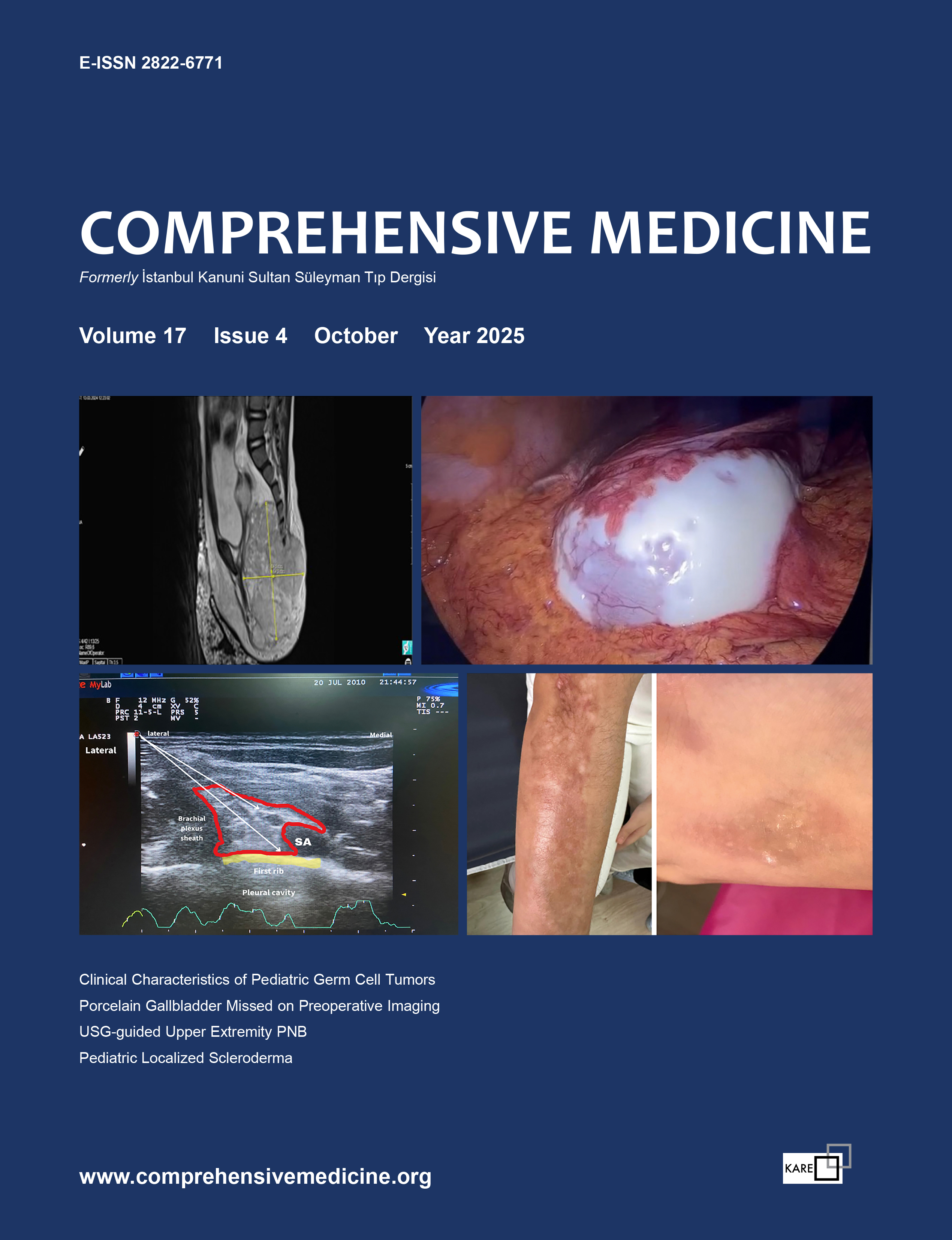Evaluation of Fermented Food Consumption During Pregnancy and Breastfeeding in Mothers of Children with Egg Allergy
Halil Alkaya1, Uğur Altaş1, Seda Çevik1, Zeynep Meva Altaş2, Ebru Oğultkekin Vazgeçer3, Mehmet Yaşar Özkars11Department of Pediatric Allergy and Immunology, University of Health Sciences, Ümraniye Training and Research Hospital, İstanbul, Türkiye2Department of Public Health, Maltepe District Health Directorate, İstanbul, Türkiye
3Department of Pediatrics, Ümraniye Training and Research Hospital, İstanbul, Türkiye
INTRODUCTION: Fermented foods, such as yogurt and kefir, provide health benefits. This study explores how fermented food consumption during pregnancy and breastfeeding may affect the development of egg allergy in children.
METHODS: The study included mothers of 50 children diagnosed with egg allergy and a control group of mothers of 52 healthy children of the same age group. Retrospective analysis was performed on data such as the mothers’ consumption of fermented foods during pregnancy and breastfeeding, sociodemographic characteristics, and family history of allergies.
RESULTS: It was observed that the case and control groups were similar in terms of age, gender, gestational age, maternal weight gain during pregnancy, and mode of delivery (p>0.05). However, the mean age of mothers in the case group was significantly lower than that in the control group (p=0.008). There was a significant difference in maternal education level between the groups (p=0.044). No statistically significant differences were found between the groups in terms of fermented food consumption, including yogurt, cheese, kefir, tarhana, pickles, and fermented sausage (sucuk), during pregnancy and breastfeeding (p>0.05).
DISCUSSION AND CONCLUSION: The findings indicate that the fermented food consumption habits of mothers of children with egg allergy during pregnancy and breastfeeding were not different from those of mothers in the control group. These results suggest no relationship between fermented food consumption and the development of egg allergy in children. However, further extensive studies are needed on this subject.
Keywords: Allergic diseases, breastfeeding, egg allergy, fermented food consumption, pregnancy
Yumurta Alerjisi Olan Çocukların Annelerinde Gebelik ve Emzirme Sürecinde Fermente Gıda Tüketiminin Değerlendirilmesi
Halil Alkaya1, Uğur Altaş1, Seda Çevik1, Zeynep Meva Altaş2, Ebru Oğultkekin Vazgeçer3, Mehmet Yaşar Özkars11Ümraniye Eğitim ve Araştırma Hastanesi, Çocuk Alerji İmmünoloji Bilim Dalı, İstanbul2Maltepe İlçe Sağlık Müdürlüğü, Halk Sağlığı, İstanbul
3Ümraniye Eğitim ve Araştırma Hastanesi, Çocuk Sağlığı ve Hastalıkları Anabilim Dalı, İstanbul
GİRİŞ ve AMAÇ: Çalışma, yumurta alerjisi tanısı almış 50 çocuğun annesi ile aynı yaş grubundaki 52 sağlıklı çocuğun annelerinden oluşan kontrol grubunu içermektedir. Çalışmada, annelerin hamilelik ve emzirme döneminde fermente gıda tüketimi, sosyodemografik özellikleri ve ailede alerji öyküsü gibi veriler prospektif olarak analiz edilmiştir.
YÖNTEM ve GEREÇLER: Çalışma, yumurta alerjisi tanısı almış 50 çocuğun annesi ile aynı yaş grubundaki 52 sağlıklı çocuğun annelerinden oluşan kontrol grubunu içermektedir. Çalışmada, annelerin hamilelik ve emzirme döneminde fermente gıda tüketimi, sosyodemografik özellikleri ve ailede alerji öyküsü gibi veriler prospektif olarak analiz edilmiştir.
BULGULAR: Vaka ve kontrol gruplarının yaş, cinsiyet, gebelik süresi, gebelikte anne kilo artışı ve doğum şekli açısından benzer olduğu gözlemlenmiştir (p>0,05). Ancak, vaka grubundaki annelerin ortalama yaşı, kontrol grubundakilerden anlamlı derecede daha düşüktü (p=0,008). Gruplar arasında annelerin eğitim seviyesi açısından anlamlı bir fark bulunmuştur (p=0,044). Hamilelik ve emzirme dönemlerinde yoğurt, peynir, kefir, tarhana, turşu ve fermente sucuk gibi fermente gıda tüketimi açısından gruplar arasında istatistiksel olarak anlamlı bir fark bulunmamıştır (p>0,05).
TARTIŞMA ve SONUÇ: Bulgular, yumurta alerjisi olan çocukların annelerinin, hamilelik ve emzirme dönemlerinde fermente gıda tüketim alışkanlıklarının, kontrol grubundaki annelerden farklı olmadığını göstermektedir. Bu sonuçlar, fermente gıda tüketimi ile çocuklarda yumurta alerjisinin gelişimi arasında bir ilişki olmadığını düşündürmektedir. Ancak, bu konuda daha kapsamlı çalışmalar gerekmektedir.
Anahtar Kelimeler: yumurta alerjisi, hamilelik, emzirme, fermente gıda tüketimi, alerjik hastalıklar
Manuscript Language: English






















